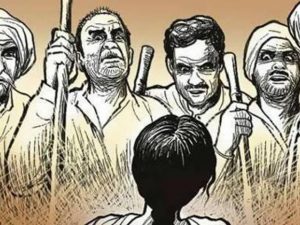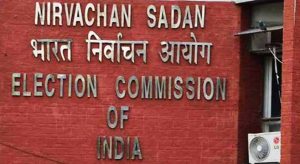
25-07-2017 (Important News Clippings)
To Download Click Here.
Forthcoming Supreme Court decision on right to privacy one of the most important legal decisions in the world this year
By Eben Moglen and Mishi Choudhary,Eben Moglen is Professor of Law and Legal History at Columbia Law School. Mishi Choudhary is Legal Director and President of SFLC.in

Privacy is, as Brandeis and Warren said in 1894, “the right most valued by civilised men”, “the right to be left alone”. But in our age, the age of the internet, the right to be left alone includes also the right not to be put out there, or exposed involuntarily. Forced disclosure of the information that comprises our identities, in the age of biometric identification, social profiles, and cashless economic transactions, damages an essential component of all personal liberties. Whether the individual’s information is used on its own, or is analysed, profiled, or linked in the “social graph” to that of other related persons, forced disclosure of personal information in today’s society creates power in the state which receives that information.Not all of the constitutional right of privacy cases in the age of the internet will involve forced disclosures. The cases that will matter most, should the court decide in favour of the fundamental right, will be where the government imposes a form of disclosure that, like limitations on physical movement, inhibits the “ability to be oneself”.
In these cases, the court would find that the fundamental right to privacy is infringed when forced disclosures of personal information to government interfere with the exercise of any of the freedoms the Article 19 protects, when you cannot actually have your freedom of movement, or of expression, for example, because you are compelled to give information that empowers government to restrict or deny your rights.So, for example, if the government were to do here what the Chinese government has done since the death of Liu Xiaobo, not only blocking messages of mourning or containing pictures of Liu on WeChat (the Chinese equivalent of WhatsApp), but also keeping track for subsequent surveillance of everyone sending or receiving such messages, this surveillance based on private expressions of emotion or opinion would violate the freedom of expression in Article 19.
The same applies to the liberties guaranteed by Article 21. Where, for example, an Aadhaar number is required before a patient can request ambulance service, as has been ordered recently in UP, the right to medical care protecting life declared by the Supreme Court in Parmanand Katara vs the Union of India is violated by the compelled disclosure of identity.We think that, if the Supreme Court decides the present issues fully, it will find that the common factors in all successful constitutional privacy claims are (1) the forced disclosure of personal information; (2) under circumstances adversely affecting an individual’s ability to exercise freedoms protected by Article 19 or liberties guaranteed by Article 21. Also, under the terms of Article 14, that all persons must be equally treated with respect to requirements of personal information disclosure, without discrimination.
The importance of a fundamental right in our system is that it can only be enforced against the state. “Platform” social media companies receive voluntary disclosures of personal information in immense quantities every minute, but they are not subject to constitutional controls. Moreover, though these corporates are indeed ubiquitous in our lives, they are not obligatory. In dealing with them, we still have choices. Only the power of the state can, in fact, compel us to expose ourselves more fully than we choose to do. The state can as well, of course, legislate to protect our privacy against private parties, and should do so.The forthcoming decision of the Supreme Court will be one of the most important legal decisions in the world this year. Societies far beyond India will be watching to see what it decides. India will, as a result of the Supreme Court’s judgment, take the lead among democracies in recognising and enforcing its citizens’ fundamental right to privacy, or fall in line behind despotic societies in destroying it.
The boycott ban
on Maharashtra’s law against social boycott
Maharashtra’s law criminalising social ostracism is a template for other States
EDITORIAL

This is not the first law of its type. Bombay enacted a law against excommunication in 1949, but it was struck down by the Supreme Court in 1962 after the Dawoodi Bohra community successfully argued that it violated the community’s constitutional right to manage its own religious affairs. One hopes the latest Act will not be vulnerable to legal challenge. Article 17 of the Constitution and the Protection of Civil Rights Act outlaw untouchability in all its forms, but these are legal protections intended for the Scheduled Castes. In reality, members of various castes and communities also require such protection from informal village councils and gatherings of elders who draw on their own notions of conformity, community discipline, morality and social mores to issue diktats to the village or the community to cut off ties with supposedly offending persons and families. The case of a mountaineer from Raigad is somewhat notorious. He had conquered Mt. Everest but could not escape a social boycott in his village because his wife wore jeans and did not wear a mangalsutra. It is not a proud moment for a country when special legislation is required to prohibit social discrimination, ostracism and practices repugnant to human dignity. Yet, given the prevailing circumstances, any legislative assault on abhorrent social practices ought to be welcomed.
Cleaning the House
Must tainted legislators be debarred from polls? For how long? Answers are about to come in
 Criminalisation of politics has been a matter of great concern, particularly in the last two decades. The Supreme Court’s latest order asks the Election Commission to clarify its position on the PIL seeking a lifelong ban on candidates convicted in criminal cases. Just a couple of months ago, the EC had supported the petitioner. In the hearing on July 18, however, the EC’s advocate took a different stand.
Criminalisation of politics has been a matter of great concern, particularly in the last two decades. The Supreme Court’s latest order asks the Election Commission to clarify its position on the PIL seeking a lifelong ban on candidates convicted in criminal cases. Just a couple of months ago, the EC had supported the petitioner. In the hearing on July 18, however, the EC’s advocate took a different stand.
“[The] Commission has not taken any decision and doubts whether it falls in the legislature’s domain,” he told the court. Since this stand was inconsistent with the one taken earlier, the Supreme Court came down heavily on the EC. “Can you afford to remain silent when it is within the domain of the commission? If you don’t want to be independent, if you want to be constrained by the legislature, constrained even to express your views, say so freely,” it said.
Such a rebuke to the commission is unprecedented. The Supreme Court, in fact, has been extremely supportive of the EC, so much so that I have always described it as the commission’s guardian angel. When the matter comes up before the court next, it is expected that the EC will unequivocally reiterate the plea to debar convicted MPs and MLAs for life from contesting elections. “The Commission has not taken any U-turn and is unambiguously in sync with the petitioner’s prayer to debar the convicted legislators (MPs and MLAs) for life,” the commission’s officials have clarified.My personal opinion is that the lifelong ban is too harsh. Under the present law, the minimum bar of a politician from election is eight years (two years of minimum imprisonment followed by six years of ban). That is enough to kill his political career.
The positive aspect of the unpleasant situation is that the need for cleansing politics of criminal influence has been flagged once again. The issue has two dimensions: One, how to deal with the politicians after conviction and, two, before conviction, while they are still under trial.Protecting the parliamentary system from criminalisation has been the intention of the law from the beginning. Section 8 of the Representation of the People (RP) Act, 1951 disqualifies a person convicted with a sentence of two years or more from contesting elections. But those under trial continued to be eligible to contest elections. The Lily Thomas case (2013), however, ended this unfair advantage.
The SC has repeatedly expressed concern about the purity of legislatures. In 2002, it made it obligatory for all candidates to file an affidavit before the returning officer, disclosing criminal cases pending against them. Civil society organisations like the Association for Democratic Reforms (ADR) analyse and publish this information. The concern of the apex court has been increasingly clear from a series of judgments. The famous order to introduce NOTA was intended to make political parties think before giving tickets to the tainted. According to the ADR’s analysis of EC data, 187 MPs in the current Lok Sabha face criminal charges (that is, 34.4 per cent). Of them, 113 face serious criminal charges. The number has gone up from 162 (76 serious) charges in 2009 and 128 (58 serious) in 2004. This obviously shows the political class and legislature in a poor light. What is the way out? There are three possible options. One, political parties should themselves refuse tickets to the tainted. Two, the RP Act should be amended to debar persons against whom cases of a heinous nature are pending from contesting elections. Three, fast-track courts should decide the cases of tainted legislators quickly.
Far from denying tickets to criminals, all political parties seem to have been in competition to give them more and more tickets. They have been unitedly opposing the proposal to debar perpetrators of even heinous offences during pendency of trial on the grounds that false criminal cases may be filed by opponents. This concern is partly valid. However, the EC’s proposal itself has three safeguards. First, all criminal cases would not invite the ban — only heinous offences like murder, dacoity, rape, kidnapping or moral turpitude. Second, the case should have been registered at least a year before the elections. Third, the court must have framed the charges.The opponents of the proposal also argue that the jurisprudence followed in the country holds that a person is innocent until proven guilty. Then what about the over 2.7 lakh persons today who are undertrials (and are therefore “innocent”) and locked up in jails? Their fundamental rights of liberty, freedom of movement, freedom of occupation and dignity are denied. Does this not violate the fundamental right of equality? If the rights of an undertrial can be suspended within the ambit of the law, what is the problem about temporarily suspending the right to contest an election, which, incidentally, is only a statutory right?
Another pertinent question is will fast-track courts be illegal as they will treat the cases against politicians differently from the lakhs of other cases awaiting a decision for years? No. Fast tracking has been the accepted norm. Special CBI courts, consumer courts, special courts for economic offences and, more recently, fast-track courts for rape cases do create special categories for adjudication, and nobody has dubbed them discriminatory.The RP Act also recognises the principle of fast-tracking, requiring the high court to decide on election petitions within six months. The fact that courts have been taking years to decide on election petitions makes it an issue of dereliction by the judiciary of its statutory obligation, not a deficiency of the law.
This has been addressed by the landmark judgment of March 2014, in which the SC accepted the urgent need for cleansing politics of criminalisation and directed all subordinate courts to decide on cases involving legislators within a year, or give reasons for not doing so to the chief justice of the high court. The government of India promptly offered full support for the implementation of this order. It is important to see how the SC judgement has been implemented on the ground.With the SC positively inclined and the PM’s concern for a corruption-free India through electoral reforms, the problem may finally be nearing resolution. The writer is former chief election commissioner of India, and author of ‘An Undocumented Wonder — The Making of the Great Indian Election’
Date:24-07-17
A Litmus Test
Supreme Court must interpret Constitution in a manner that ensures right to privacy
In India, people have the right to life, but fake encounters and mob lynching happen. In spite of the right to free speech, publications feel compelled to withdraw articles critical of government or corporates. There is a right to equality but discrimination is still rampant.
When the mention of fundamental rights in the Constitution is not able to ensure their full implementation on ground, one wonders what will happen if privacy is not recognised as a fundamental right. In such a situation, citizens may not have protection against surveillance and even profiling by the state, the state could target those who speak against it, even voting preferences may be influenced, telephone tapping could be routinely resorted to and our mails intercepted. This is indeed a terrifying prospect.
The right to privacy is not explicitly mentioned in the Constitution. But then the right to “due process” too was not there and, in fact, was dropped by the framers of the Constitution. Yet, the apex court read it into the “right to personal liberty”. The court, in fact, silently brought about what may be called a “rights revolution” by judicially creating several fundamental rights.
When the democratic state turned totalitarian under Indira Gandhi and started abusing its powers to amend the Constitution, the Supreme Court as protector of civil liberties stood firm and applied the brakes first, in 1967, by denying Parliament power to amend the Constitution and then, in 1973, through the “basic structure” doctrine which too is not there in the text of the Constitution.
If the text of the Constitution alone is going to determine the nature of the right to privacy, then the collegium system, the right against arbitrariness and the freedom of press too could go soon. Voluntary surrender of personal information to private entities cannot be equated with mandatory data collection by the state. The right to privacy judgment will be a litmus test for the apex court.
Will the court follow the rich traditions of 1967 and 1973 and rise to the challenges of the information age? One hopes there would not be another ADM Jabalpur (1976) kind of decision where the majority accepted the government’s argument that when the right to life and personal liberty is suspended, citizens have no remedy against illegal detention.
It is erroneous to believe that eight- and six-judge benches have authoritatively held that there is no right to privacy. In the Satish Chandra case (1954), the fundamental question was whether the state’s power of search and seizure violated the right against self-incrimination under Article 20(3). In a positivist mould, the court refused to read right to privacy under this provision.
Then came the Kharak Singh (1963) case where a dacoity accused was released and put under surveillance. Police constables would knock at his door, wake him up during night and disturb his sleep. The majority conceded that “everyman’s home is his castle” and struck down domiciliary visit regulations. But without any elaborate discussions, the court yet again said that there was no fundamental right to privacy in India.
But there was the powerful dissenting judgment of Justice Subba Roa, with whom Justice J.C. Shah concurred. They argued that even though the right to privacy is not specifically mentioned in the Constitution, it is a necessary ingredient of the right to personal liberty. In the Gobind case (1975) the minority opinion of Kharak Singh case became the majority opinion. The court has recognised right to privacy as an integral part of right to personal liberty. Today, liberty is a part of the basic structure of the Constitution.
Despite the recognition of privacy as a fundamental right, the government will continue to have powers to impose “reasonable restrictions”. It is no body’s case that the right to privacy is an absolute right. Moreover, global experience shows that the denial of privacy neither promotes national security nor curbs terrorism, it merely takes away citizen’s freedom to be left alone and curtails his/her choice in personal decisions.



